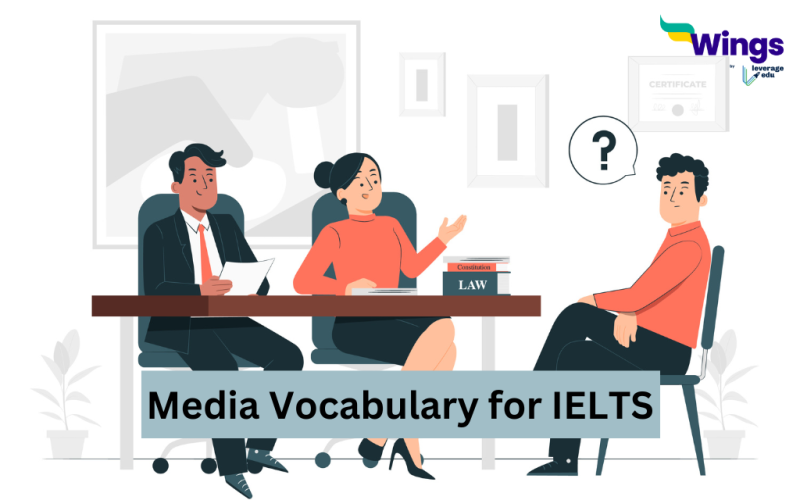IELTS (International English Language Testing System) is a standardized test used to assess the English language proficiency of non-native English speakers who wish to study, work, or migrate to English-speaking countries. In speaking and writing test sections, questions are related to different topics such as festivals, media, politics, etc. In this blog, we will mention the words and their meaning to improve media vocabulary for the IELTS exam.
The test assesses the four skills of candidates: listening, reading, writing, and speaking. To answer such questions, students need to have a good grasp of relevant words and phrases which they can include in their answers.
This Blog Includes:
Use of Media Vocabulary in IELTS Exam
Improving your vocabulary for IELTS Exam will help you to write or speak your answer in a more decent way. In the IELTS speaking exam, you may be asked to speak about media and news-related topics. Here, adding media-related words can make your answer presentable.
Media Vocabulary Used in IELTS
Some media-related vocabulary that students can use while preparing for their IELTS is mentioned below.
| Words | Meaning |
| Breaking news | Useful information about the current ongoing events taking place in the country. |
| Broadcast | A program or message that is transmitted over the airwaves or internet for public consumption |
| Media literacy | The ability to critically evaluate and understand the content and messages presented in various media formats |
| Censorship | The tendency to favour one perspective or point of view over others |
| Propaganda | Information or messages that are biased or misleading, are often used for political or ideological purposes. |
| Sensationalism | The practice of presenting news or information in a way that is intended to be shocking or exciting, often at the expense of accuracy or context |
| Tabloid | A type of newspaper or magazine that focuses on sensational and often controversial stories |
| Infotainment | A type of media content that combines information and entertainment, often in a light-hearted or humorous manner |
| Digital footprint | The trail of information and data that is left behind by an individual’s online activities |
| Public opinion | The collective views and attitudes of the general public on a particular issue or topic |
| Bias | The tendency to favor one perspective or point of view over others |
Idiom and Phrases of Media Vocabulary
Using idioms and phrases correctly in your writing and speaking can help you to demonstrate a deeper understanding of media-related vocabulary and concepts in the IELTS exam. There are some commonly used idioms and phrases related to media that you may encounter in the IELTS exam
| Idioms and Phrases | Meaning |
| Be in the Limelight | To, be the center of attention or public scrutiny |
| Hit the Headlines | To become the main story in the news |
| Go Viral | To rapidly spread and become widely popular on the internet or social media |
| Catchy Headline | A memorable and attention-grabbing title for a news article or story |
| Media Circus | A situation where the media frenzy around an event or issue becomes excessive or chaotic |
| Spin Doctor | A person who works to manipulate or control the way a story or issue is presented to the public |
| Sound Bite | A brief and memorable quote or statement from a public figure or news story |
| Old Media | Traditional forms of media, such as newspapers, television, and radio, that have been largely replaced by digital media |
| New Media | To, be the centre of attention or public scrutiny |
| Off the Record | Information or comments were given to a journalist that is not intended to be published or attributed to the source. |
Remember to practice using them in context and to be aware of their different meanings and connotations.
When preparing for the IELTS exam, it is important to be familiar with the sub-topics and to practice expressing your opinions and ideas about them in English. You can do this by reading articles and watching videos about media-related issues, and by practicing writing and speaking about these topics.
FAQs
Using idioms and phrases correctly in your writing and speaking can help you to demonstrate a deeper understanding of media-related vocabulary and concepts in the IELTS exam. Some commonly used idioms and phrases are in the limelight, old media, hit the headlines, spin doctor, and many more.
Media is a common topic in the IELTS exam, particularly in the writing and speaking sections. There are many topics such as social media, news media, entertainment media, media ownership, and advertising, on which the questions are generally asked.
The vocabulary that students can use while answering media-related questions in IELTS is a digital footprint, infotainment, propaganda, censorship, breaking news, and broadcasting.
If you are aiming to appear for IELTS 2023, Then follow Leverage Edu‘s Leverage Live classes and our top trainers and strengthen your English score as well as your application so that you can secure your spot in your dream college. Fulfil your dreams of studying abroad with Leverage Edu, to get a free counselling session, reach us at 1800527130. Don’t forget to follow us on Facebook, Instagram, LinkedIn, and Twitter.


 One app for all your study abroad needs
One app for all your study abroad needs












 60,000+ students trusted us with their dreams. Take the first step today!
60,000+ students trusted us with their dreams. Take the first step today!